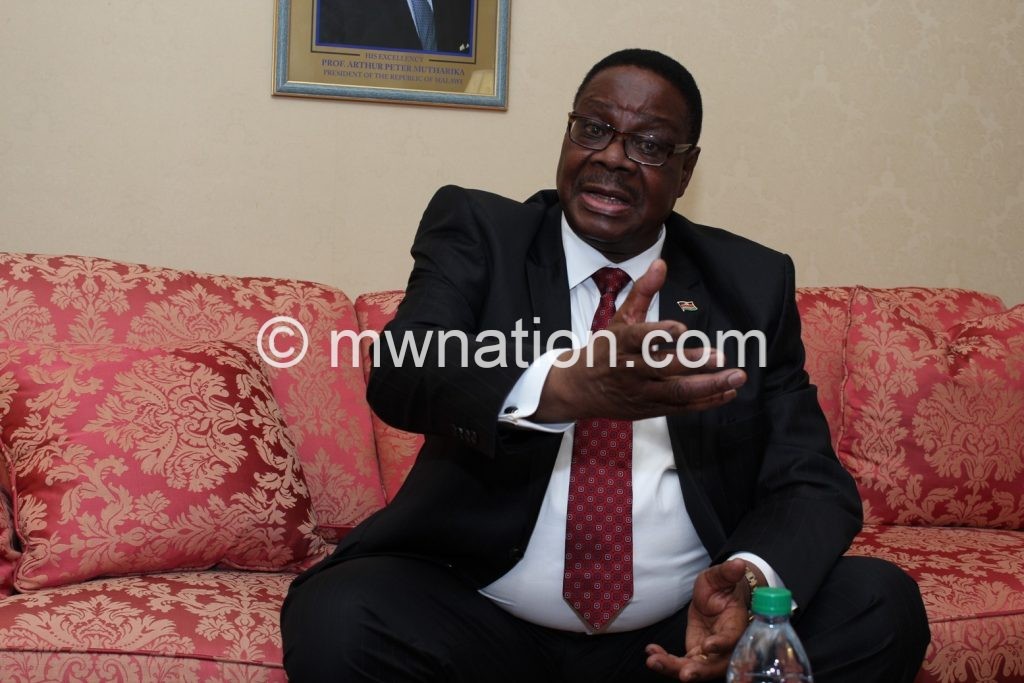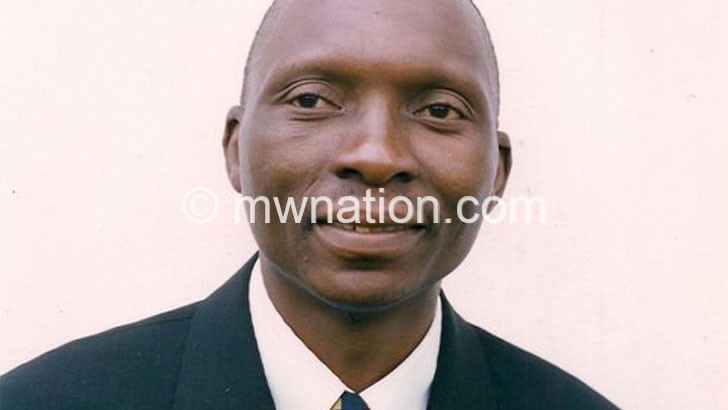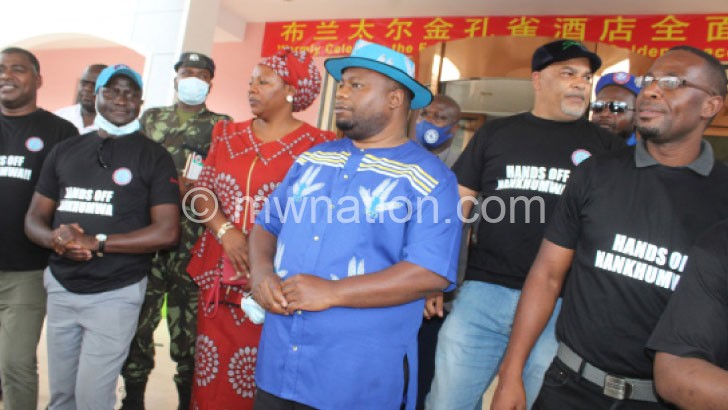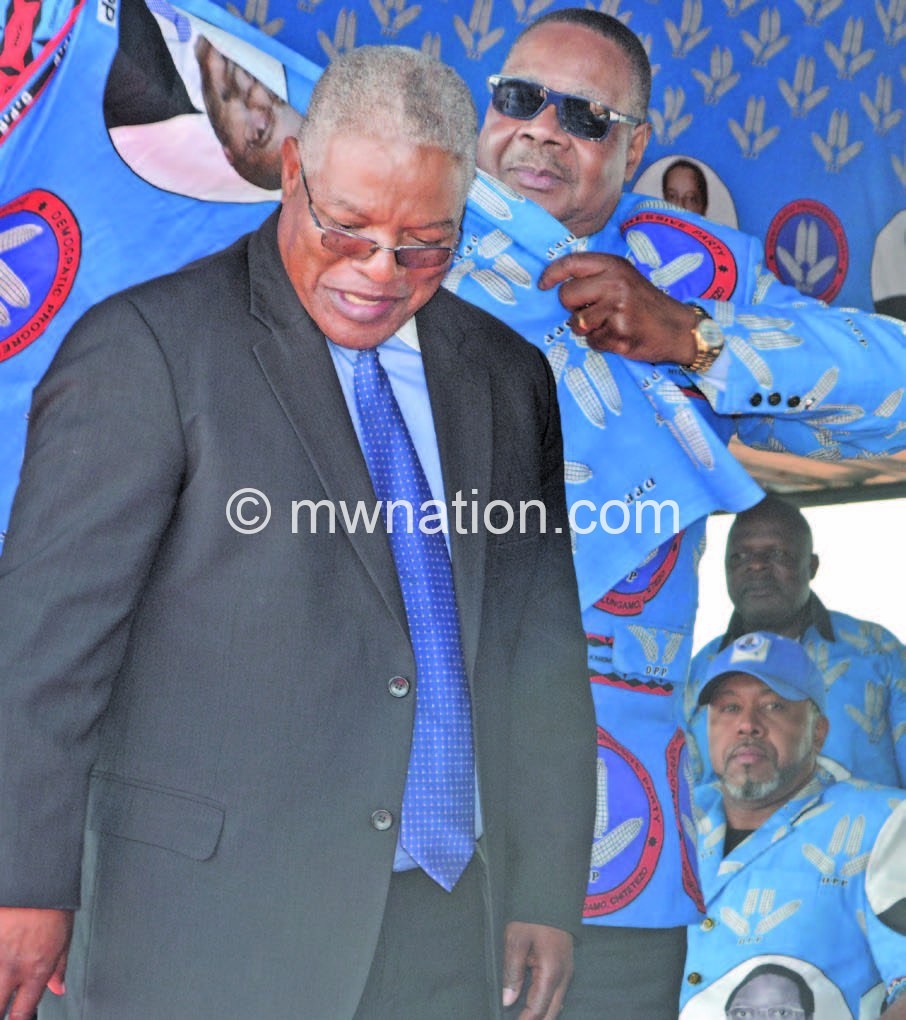Experts write off DPP
Barely four months out of government, a shade of uncertainty overshadows the future of the erstwhile governing Democratic Progressive Party (DPP) following a string of resignations, squabbles and convictions.
The party is set to receive a report on structure review of the party and recommendations from a Functional Review Committee appointed last month.

The review committee, headed by DPP vice-president (Eastern Region) Bright Msaka, will present the report to the party’s working committee today before the leadership meets to discuss it alongside matters relating to the much-anticipated elective national convention.
But this is coming at a time the party is losing several of its top officials through resignations, convictions and squabbles over leadership in the middle of deeper divisions and discontent from within its rank and file.
Political and governance analysts have attributed the current ‘undesirable’ developments in the DPP to failure by its leader Peter Mutharika to bring about inspiration since losing elections in June this year.
For the past three months, the party has lost its vice-president (Central Region) Uladi Mussa and its regional governor (North) Christopher Mzomera Ngwira, who were convicted and sent to jail for abuse of office.

Those who have either quit their positions or the party altogether, include former director of elections Ben Phiri, former director of operations Rev Mwayi Kamuyambeni and former Eastern Region governor Julius Paipi. The three have argued they see no “new and viable strategies” to take back the party into power. Paipi has since joined UTM Party.
At its meeting at Mutharika’s beachside retirement home in Mangochi, the DPP central committee appointed Brown Mpinganjira as the party’s new publicity secretary replacing Nicholas Dausi. Mpinganjira was to be deputised by executive member Henry Mussa, who trashed both his appointment and that of Mpinganjira, arguing they were unconstitutional because there was no communication that Dausi—who the party convention elected in 2018—was no longer the party spokesperson.
Three days after Mussa turned down the appointment, DPP deputy publicity secretary Chris Taulo announced his resignation from the party citing the ongoing squabbles as the reason.
As if that is not enough, the party has also lost some members of Parliament (MPs) such as Susan Dossi (Chikwawa West), who joined UTM, while Eurita Ntiza Valera (Nsanje South West), John Bande (Blantyre City East), Ken Ndovie (Karonga Nyungwe), Tony Ngalande (Balaka North) and Salim Bagus (Chikwawa Central) have all defected to Malawi Congress Party (MCP). The MPs won their seats as independents before joining the DPP.
Ernest Thindwa, a political scientist from Chancellor College, a constituent college of the University of Malawi (Unima), observed things were falling apart in the former governing party because “Peter Mutharika is not the best for the DPP.”

He said: “Mutharika epitomises several attributes of a failed leader which the DPP does not need at the moment. So the faster they get rid of him and put in a person who can rebrand the party and sell it to Malawians, the better. Otherwise not many Malawians will buy the DPP brand because they know what will likely come out of him.”
Thindwa proposed the party needed to identify a person who could symbolise its change to start winning back people’s confidence.
He also said loss of patronage resources by virtue of losing the June 23 court sanctioned presidential election has also affected the DPP as the development meant the party also lost access to public resources which they used to buy loyalty.
“Now with that patronage resource denied people no longer have incentive to remain loyal and conform to leadership dictates,” said Thindwa.
The political scientist further noted that lack of a democratic culture has weakened the party to deal with competition for leadership position.
“Had the party been democratic the contest for leadership position would have been managed without disruption, therefore, they lack capacity to manage competition or the leadership issue within,” Thindwa said.
Another Chancellor College political scientist Mustapha Hussein observed the prevailing challenges were as a result of lack of decisiveness regarding the handling of power after losing an election.
“The party is still [clinging on to] a unilateral approach because of the ownership issue… As of now the party is becoming weaker and weaker by the day because of the wrangles and this may disorganise and further weaken the opposition [for checks and balances],” he said.

Hussein said there was need to allow democracy to flourish and resolve the leadership wrangle in the party through an urgent convention.
“Perhaps, the party may also consider taking a radical approach and start thinking of merging with the United Democratic Front to become one party and make the opposition strong,” he said.
University of Livingstonia political scientist George Phiri also concurred with Thindwa and Hussein, saying the developments in the party was “a clear manifestation of Mutharika’s failed leadership.”
“It seems Peter has his own egos which he fails to manage as a result he has now seen that he has lost leadership of the party and he has also lost the party because if fellow leaders are leaving it means the party is dead. There is no way a party can exist without the leaders,” he said.
Phiri said Mutharika needed to appreciate why people want a convention otherwise it was “quite embarrassing for him to be calling himself a leader when people are running away from him while others are rising up against him.”
“The DPP is currently dead. The brand cannot sell well on the market because there are several issues that, as a country, people have lost their hope in the DPP. If I were Mutharika I would have immediately called for a convention,” Phiri said.
Since the party lost the election, some of its senior members have been agitating for leadership change, saying Mutharika is old and had failed the party.
This resulted in the emergence of serious cracks and camps over who should take over from him.
The squabbles and toxic relationship went to another level after 48 DPP legislators elected Kondwani Nankhumwa as Leader of Opposition (LoP) against four votes for Nsanje Central legislator Francis Katsaila, the party’s as well as Mutharika’s preferred choice. The party is still fighting to overturn Nankhumwa’s election as LoP.
Reacting to the development the party’s central committee fired Nankhumwa, secretary general Grezelder Jeffrey, treasurer general Jappie Mhango and Mulanje West legislator Yusuf Nthenda.
Nankhumwa was replaced as vice-president (South) by Joseph Mwanamvekha while Kasaila replaced him as LoP but Nankhumwa together with Jeffrey, obtained a court injunction restraining their removal.
Last week, Mutharika told the media, in his first public address since losing, he was not clinging to the position of party president but wanted a proper transition so that no one hijacks the party.
Mutharika argued the Functional Review Committee would settle the disputes once it comes up with its recommendations. The committee is expected to present its report today.
But governance commentator Makhumbo Munthali feels while the party’s future depend on how it handles the succession issue.
“One would hope that a democratic convention would be a solution to the current squabbles,” he said.
Munthali queried the setting up of the Functional Review Committee describing it as a “red flag on a tacitly calculated move to bar some potential stronger candidates from standing.”
“If this is the path DPP will take, then we should expect even more and deeper divisions and frustrations from their supporters who may be denied the chance to choose a leader of their heart to replace Mutharika through a credible, fair and transparent convention.
Munthali said: “The only way DPP can remain relevant is by allowing intra-party democracy to thrive when handling the succession issue. It’s important that the will of the DPP supporters not a few political leaders’ self-interests, should reign supreme.
“Otherwise, with the current bad state of DPP coupled by the continued enjoyment of public support by the Tonse government, DPP might be on the verge of oblivion following the path of UDF and Alliance for Democracy.”
When contacted on the matter, DPP spokesperson Brown Mpinganjira asked for a questionnaire which he had not responded to as we went to press.
But he recently said his party believed in democracy and that every person had the right to associate with a political party of his or her choice.





